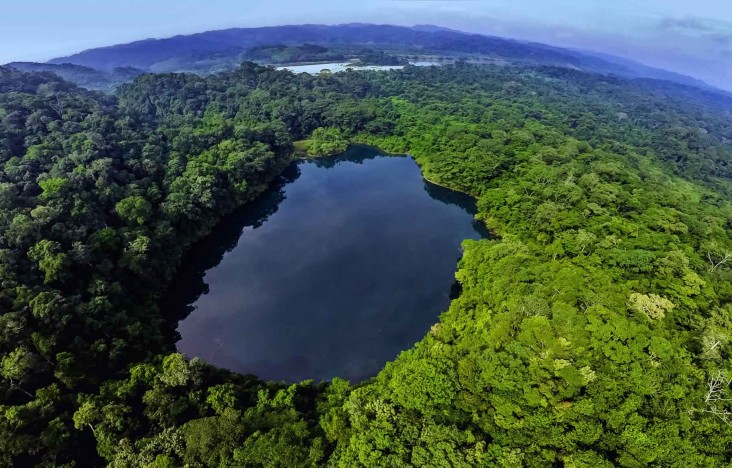Constructing a Sustainable Future for Communities and Forests in Guatemala
USAID’s work conserving biodiversity through economic opportunities. Read the story
You are viewing:
Information released online before January, 2021.
Note: Content in this archive site is NOT UPDATED, and external links may not function. External links to other Internet sites should not be construed as an endorsement of the views contained therein.
You are entering the 2017-2020 Archive for the
United States Agency for International Development web site.
If you are looking for current information, visit www.usaid.gov.

USAID’s work conserving biodiversity through economic opportunities. Read the story
USAID supports the protection of Guatemala’s environmental resources through a comprehensive approach that contributes to biodiversity protection and sustainable forest management.
Guatemala is one of the most biologically diverse nations on the planet, boasting 14 different ecoregions and immense biological and cultural diversity. Four million hectares of sub-tropical forest are found in Guatemala, 70 percent of which are located within natural protected areas covering approximately 30 percent of Guatemalan territory.
USAID environment activities conserve Guatemala’s iconic biodiversity, reduce land-based emissions, enhance national and regional security, and contribute to income generation and employment. USAID supports policy and legal frameworks that strengthens Guatemala’s System of Protected Areas, enables long-term sustainable forest management, builds an effective environmental justice sector, and engages communities whose livelihoods depend on healthy ecosystems and thriving standing forests.
USAID’s comprehensive approach has opened high value international markets for timber and non-timber forest products, increased incomes well above the minimum wage, generated lasting employment, and engaged local communities in conservation initiatives. Concurrent biological monitoring has brought iconic species back from the brink of extinction.
USAID partners with Guatemala’s private and public sectors to strengthen value chains (agriculture, non-agriculture and forestry), support small and medium businesses and improve economic opportunities for youth. Additionally, USAID partners with the government and local communities to address food insecurity, chronic malnutrition, and to support co-management of forests, agroforestry and conservation of biodiversity. USAID strengthens private sector investment in areas of high out-migration, prioritizing those geographic areas where the local/national government will also invest.
USAID supports the creation of jobs and income-generating opportunities through biodiversity conservation, protected area management, and sustainable management of forests. Activities strengthen sustainable value chains like timber and non-timber forest products, tourism, and fisheries to increase incomes and create jobs for Guatemalans. USAID pursues partnerships with American companies to strengthen demand for Guatemalan goods and expand into new markets, ensuring products meet U.S. quality standards. Simultaneously, USAID explores opportunities to help shift Guatemala’s export base from raw materials to higher-value finished goods. Expanding market access and the value of the goods being exported increases incomes for families, community wealth, and government revenue while simultaneously conserving biodiversity and strengthening the sustainable management of Guatemala’s forests.
USAID also protects livelihoods and economic activities by reducing vulnerability to natural disasters and threats including soil erosion, landslides, forest fires, and other environmental threats. USAID does this through watershed management, sustainable forest management, and protected area management. USAID has expanded its successful concessions model of forestry management to protect and enhance the natural resources that underpin the Guatemalan economy, partnering with the Government of Guatemala to extend the concession contracts. Community forest concessions have proven highly successful at conserving forest cover, improving rural livelihoods, and generating jobs. They strengthen existing and new forest enterprises while diversifying community incomes by strengthening tourism enterprises. USAID focuses on increasing and protecting economic gains for families and communities in a sustainable manner, preserving Guatemala’s natural resources for citizens and tourists now, and for generations to come.
USAID partners with government entities to reduce organized crime and improve security within protected areas. Thirty-one percent of the country lies within a protected area and limited investment in the management or government presence within these areas has created breeding grounds for organized criminal activity ranging from drug trafficking, to illegal mining, wildlife trafficking, illegal logging, and other illegal activities that threaten the protected areas and the populations that live there.
USAID also partners with government entities to build their capacity to address crimes linked to intentions to illegally migrate and crimes that impede prosperity, including environmental crimes (which are frequently perpetrated by narco traffickers and other international criminals). USAID activities build on the progress made in expanding the environmental law enforcement and justice sectors, strengthening law enforcement’s ability to monitor and gather evidence for prosecution and supporting prosecutors and judges to address environmental criminal cases. Reducing environmental crime is a critical step to weakening organized criminal networks in Guatemala and improving overall security in the country and region.
Guatemala’s immense biodiversity is a crucial resource to Guatemalan society, owing to the multiple livelihood benefits it generates. These natural resources represent the potential for significant income generation through sustainable forestry and fisheries, sustainable tourism, and other livelihood opportunities. Despite this rich biological and cultural heritage, natural resources throughout the country are threatened by habitat loss, over-exploitation, trafficking of flora and fauna, agricultural encroachment, climate change, weak governance, and organized criminal activity. Guatemalan agencies responsible for managing the country’s natural resources suffer from chronic underfunding, insufficient human resources for management and protection, and limited institutional capacity.
To compound these threats, Guatemala is one of the top ten countries most vulnerable to extreme weather events and natural disasters. Guatemala’s geographic location makes it prone to tropical storms, droughts, hurricanes and earthquakes, and the incidence of extreme weather events is predicted to worsen as a result of climate change. The country’s geographic location is compounded by high poverty and malnutrition rates, which increase the vulnerability of many Guatemalan households, especially among inhabitants of the Western Highlands and the area known as the ‘Dry Corridor.’ The ‘Dry Corridor’ is an ecological region of Central America, which encompasses some of Guatemala and is particularly vulnerable to increasingly irregular rainfall, suffering from both severe droughts and flooding.

Comment
Make a general inquiry or suggest an improvement.